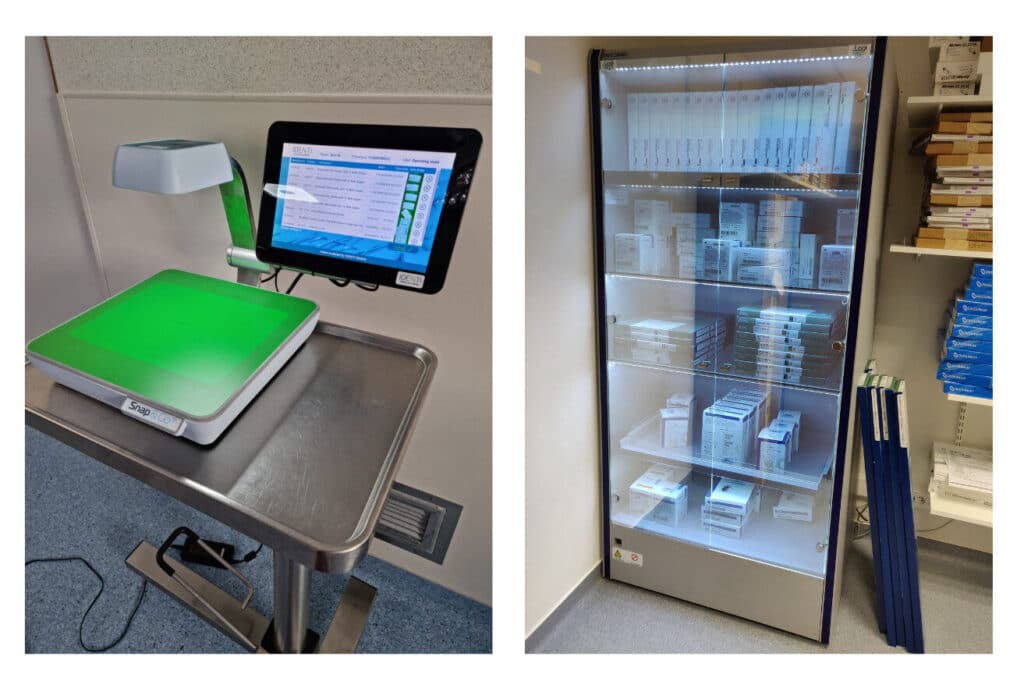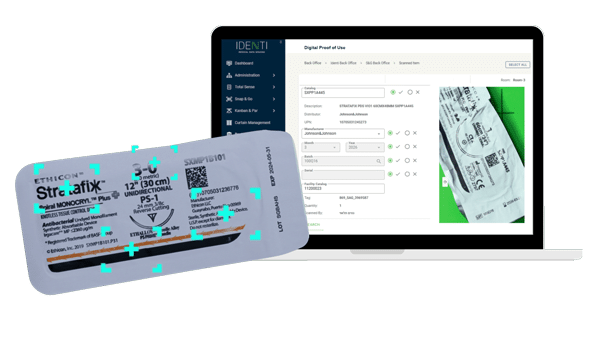What’s inside:
This blog explores how hospitals can close hidden gaps in Joint Commission compliance related to supply chain management. You’ll learn:
- Why supply documentation and traceability are critical for accreditation and patient safety.
- Common pitfalls hospitals face during Joint Commission surveys.
- How traceability, expiration monitoring, and UDI logging support compliance across EC, IC, and Leadership standards.
- How AI-powered tools like IDENTI Snap&Go and TotalSense Smart Cabinets automate documentation, improve audit readiness, and reduce operational risk.
- Practical benefits of embedding compliance into daily workflows for continuous survey preparedness.
For years, hospitals have prepared for Joint Commission surveys by focusing on patient safety checklists, medication management, and care protocols. As healthcare systems grow more complex, Joint Commission compliance now extends beyond the bedside, and gaps in supply management can pose serious risks to accreditation, patient safety, and operational efficiency.
The Joint Commission’s standards emphasize traceability, storage and sterilization practices, and documentation integrity across areas such as Environment of Care (EC), Infection Prevention and Control (IC), and Leadership. That means Joint Commission compliance doesn’t just happen in the OR or pharmacy; it starts in the supply room.
When hospital inventory systems rely on manual tracking, spreadsheets, or incomplete barcode scans, documentation gaps emerge. Missing data, expired items, and untraceable implants are common red flags that can lead to inaccurate survey findings, corrective actions, and delays in accreditation.
The Hidden Compliance Gap: Supply Chain Documentation
During surveys, Joint Commission reviewers may assess how supplies, tissue, and implants are stored, tracked, and documented. Surveyors look for documented processes and evidence that those processes are followed: proper storage, expiration monitoring, and traceability to patient use, expectations that align with EC and IC standards.
The Commission evaluates steps that address patient safety, including the handling, storage, tracking, and maintenance of supplies. Unfortunately, many hospitals discover too late that their documentation lacks the audit-ready records needed for compliance.
Common Joint Commission compliance pitfalls include:
- Unlabeled or misplaced surgical items
- Inconsistent implant tracking across departments
- Manual logs that can’t verify usage or expiration dates
- Missing documentation that an expired or recalled product was removed from inventory
Even gaps can trigger noncompliance findings, slow accreditation processes, and create additional operational and financial risks.
Traceability is A Compliance Essential
Joint Commission standards intersect with practices that depend on accurate supply tracking – infection prevention, sterile storage, and recall readiness, among them. Hospitals should be able to demonstrate that items used in patient care are:
- Properly stored and managed under documented procedures
- Monitored for and removed before expiration
- Linked in records to the procedure and the responsible clinician where required
- Retrievable quickly in case of recall or survey
Traditional manual systems make consistent traceability challenging. Automated, AI-driven inventory management systems can help transform daily supply management into a reliable, audit-ready process that supports Joint Commission compliance standards, reduces risk, and provides operational visibility.
How Does AI Help Hospitals Maintain Continuous Joint Commission Compliance?
Automated solutions like IDENTI’s AI-powered tools help hospitals capture product details at the point of use, monitor expiration and recalls in real time, and create audit-ready documentation that satisfies survey standards for continuous Joint Commission compliance.

1. Real-time, photo-based documentation
Using Snap&Go, medical implants, medication, and supplies can be captured at the point of use via image recognition. Camera vision and machine learning capture all product details and usage, and all information is recorded and integrated with a hospital’s EHR/ERP systems — creating strong, audit-grade evidence to support survey responses.
2. Expiration and recall protection
With Total Sense UHF-RFID Smart Cabinets’ continuous inventory monitoring, hospitals can track inventory from storage to the point of use. Through real-time monitoring of expiration dates and recall status, staff receive alerts to remove expired or recalled products before use. Snap&Go also notifies users if an expired or recalled item is detected at the point of use, helping prevent potential noncompliance and patient safety issues.
3. Full UDI and implant traceability
IDENTI’s system captures and logs Unique Device Identifier (UDI) data for all implants, ensuring hospitals can instantly trace any item to a patient, clinician, or procedure — a key compliance and patient safety requirement. And with access to a globally-populated SKU database, every item is verified by IDENTI, whether it’s listed in your local item master or not.

4. Complete audit visibility
Every transaction is captured in IDENTI’s secure cloud platform. During a Joint Commission survey or internal audit, hospitals can instantly generate reports and show time-stamped records demonstrating accountability.
5. Monitoring and analytics for continuous improvement
Automated collection of inventory and usage metrics lets hospitals track compliance KPIs. IDENTI’s analytics identify usage trends, deviations from established processes, and supply-chain inefficiencies — enabling targeted corrective actions and reporting to leadership.
How Can Hospitals Reduce Survey Stress and Compliance Findings?
Embedding documentation and monitoring into daily workflows, compliance transforms from a last-minute effort into a natural part of operations, helping hospitals maintain readiness and reduce findings during surveys.
Hospitals typically see benefits from automation, including:
- Fewer compliance findings related to supplies and implants
- Faster audit response and survey preparedness
- Stronger coordination between clinical, supply chain, and finance teams
Compliance, accuracy, and operational efficiency can coexist when supported by the right tools.
Compliance Is No Longer Optional
Joint Commission compliance is about maintaining safe, accountable, and transparent operations across the hospital. IDENTI helps hospitals strengthen readiness capabilities by embedding traceability and documentation into every step of supply management.
IDENTI empowers hospitals to meet and exceed those standards by embedding compliance into every supply transaction.
Pairing automated visibility from Snap & Go and Total Sense UHF-RFID Smart Cabinet with the IDENTIPlatform‘s detailed analytics, hospitals can strengthen compliance, streamline audits, and maintain continuous readiness, turning supply management into a frontline of quality and safety
Contact us to find out how IDENTI can help your hospital remain Joint Commission compliance-ready through automated supply management.






